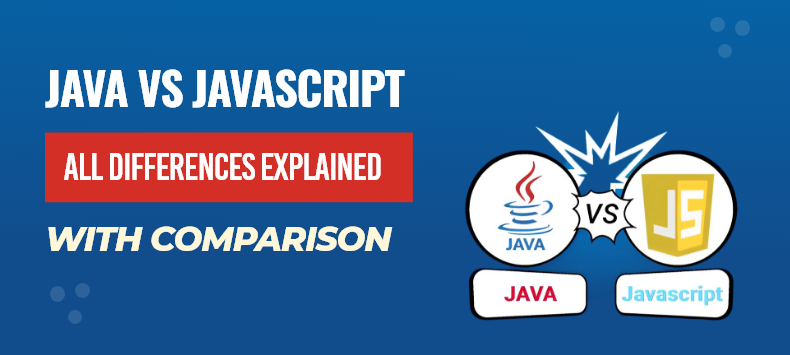
There are various debates going on about Java vs. Javascript. Are they similar? Is JavaScript a more advanced component of Java? Do they differ significantly? Does it have an inheritance relation? Let’s find it out:
Javascript and Java are frequently compared as being comparable languages. Even the majority of individuals believe that they are doing the same job. But it’s not true. Java and JavaScript are very dissimilar. The finest justification was given by UK developer Jeremy Keith:
“Java and JavaScript are similar to ham and hamsters”.
Although Java and JavaScript’s names are confusingly similar, they are unrelated. They are both very different in terms of how they are written, put together, and how they are executed. While JavaScript is best suited for creating client-side scripts for features like interaction and validation, Java is employed in a wide spectrum of server-side applications.
Moving on to clearing the myths about java and javascript being similar and deep diving into their distinct differences.
JavaScript is a lightweight programming language (sometimes known as a “scripting language”) that is used to provide interactivity to online web pages. Java is an object-oriented programming language with a virtual machine platform (JVM) that enables you to construct compiled programmes that operate on almost every platform, whereas JavaScript is also known as the browser’s language. “Write Once, Run Anywhere” was the promise made by Java.
These two programming languages both offer code for building things and the connections between them. One can get access to various properties instilled in these languages like that of inheritance, encapsulation, and polymorphism. JavaScript supports functional programming paradigms.
Java code is compiled into bytecode, which runs on the Java Virtual Machine (JVM). Java is able to be platform independent because the JVM offers a variety of operating systems as an execution environment.
Usually, the JavaScript engine of a web browser is used to run JavaScript. Each browser has a unique JavaScript engine, such as Chrome’s V8 or Firefox’s SpiderMonkey. Additionally, JavaScript can be executed on the server using tools like Node.js.
Java and JavaScript are both capable of functioning in a browser since they are both browser compliant. JavaScript is a popular choice for web development since it can be used with the majority of modern web browsers. On the other hand, Java Applets that are powered by Java can likewise run in a browser. Java Applets, however, are less used because of their compatibility and security difficulties.
JavaScript and Java manage concurrency extremely different from one another. The ability to deal with numerous threads that support parallel concurrency is one of the advantages of Java concurrency class (java.lang.Thread).
JavaScript, on the other hand, runs on a single thread and reacts to events as they happen while programming. The “event loop” is a queuing system used by JavaScript to manage concurrency. Other characteristics include heap, async/await, callbacks, event loop, and promises.
Java has a sizable ecosystem with a wide range of libraries and frameworks for different uses. Enterprise development, database connectivity, networking, multithreading, and other features are all fully supported.
The ecosystem for JavaScript is thriving and mostly geared towards web development. It has many libraries and frameworks such as React, Angular, and Vue.js, which offer strong tools for creating online applications. Additionally, libraries for server-side programming, data visualisation, and mobile app development are part of the JavaScript ecosystem.
You will undoubtedly have a clear understanding of the differences between these two well-known languages after reading this blog on Java vs. JavaScript, which has dramatically revolutionised the app development business. While Java increases the stability and security of your app, JavaScript improves the application’s appearance and feel.
You must already be aware of the language to use for your next application development project. Also, if you want to build future in these languages and become an IT expert. Choose the right institute that guides you turn you into a master developer of your field.